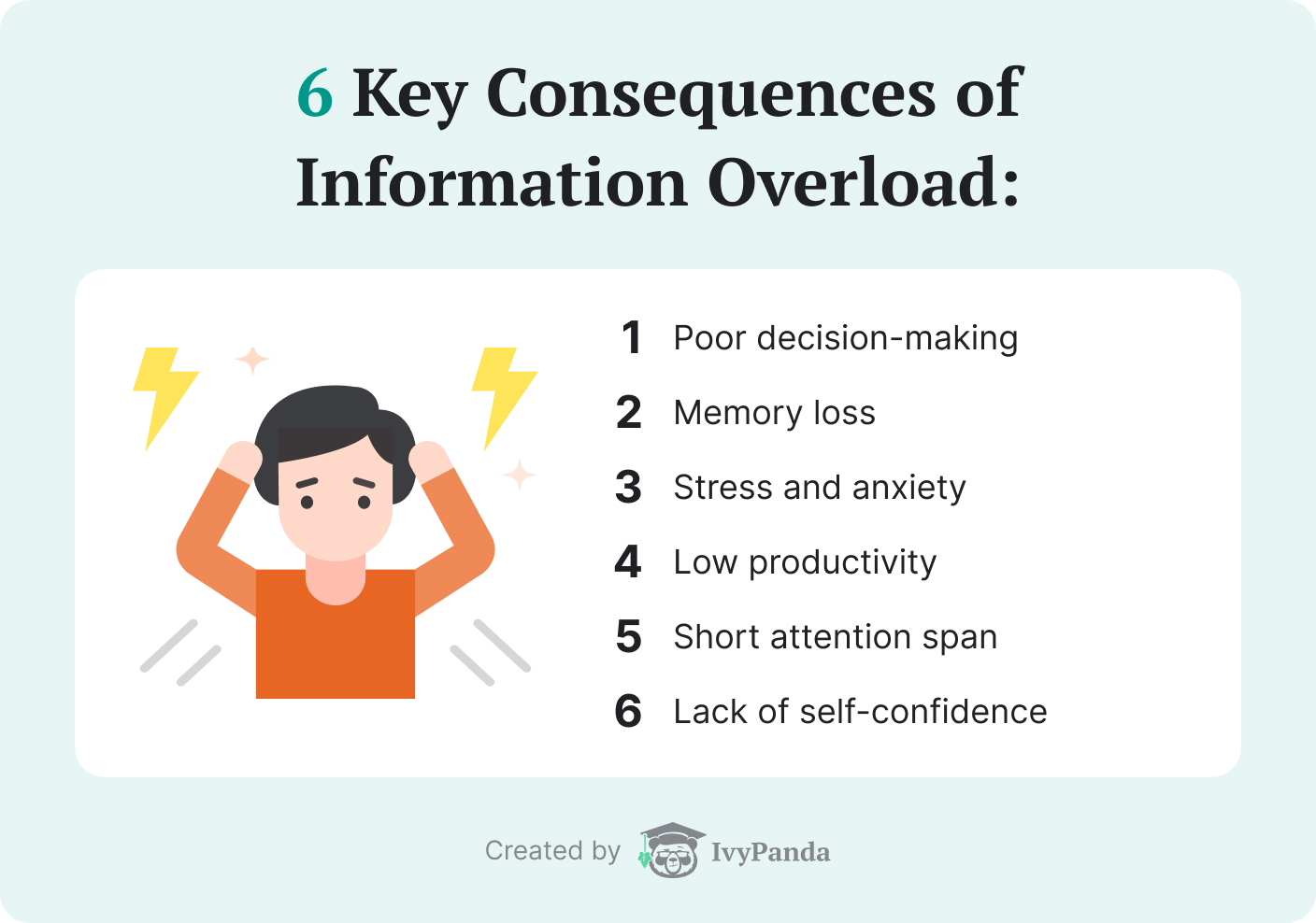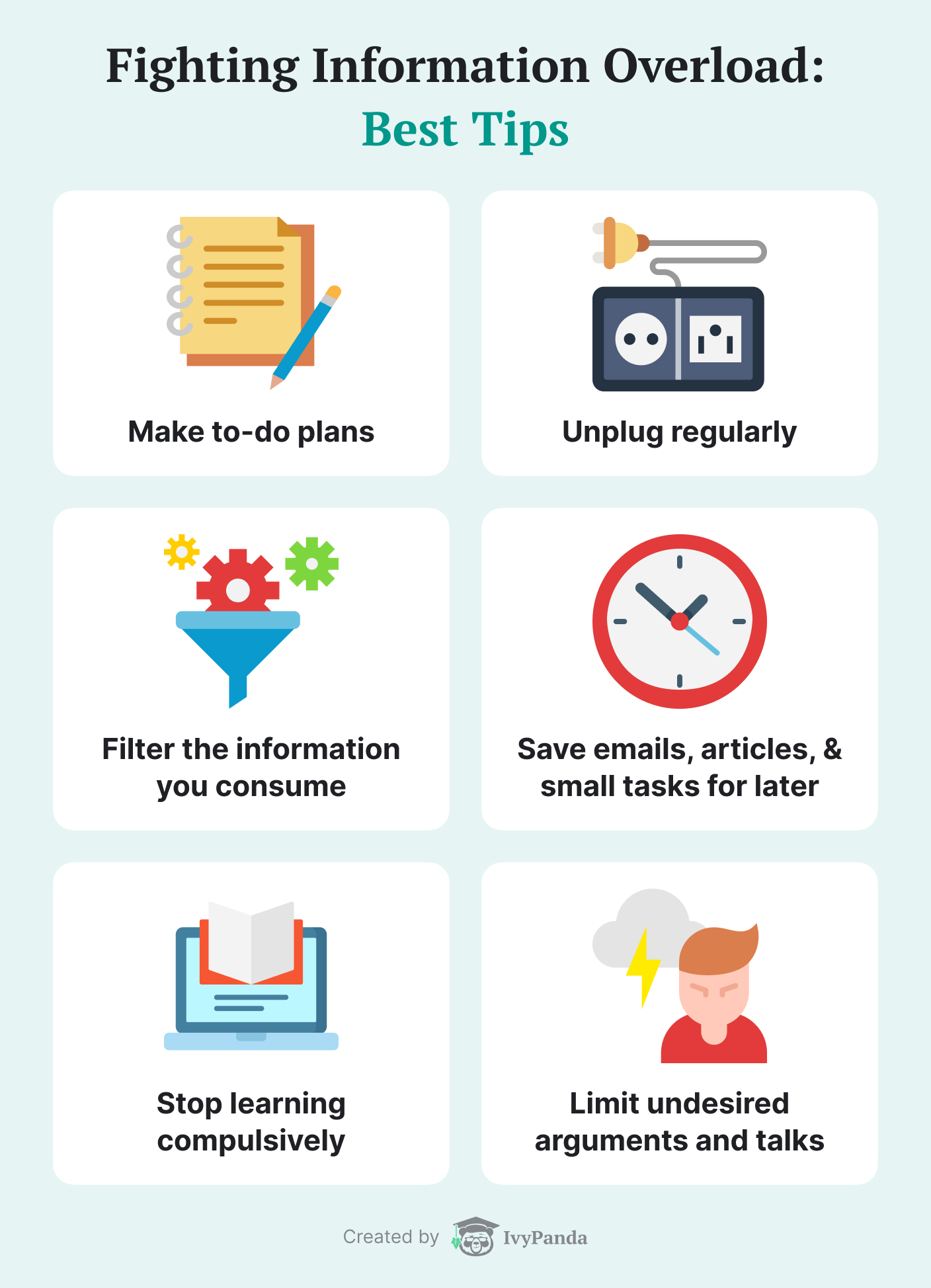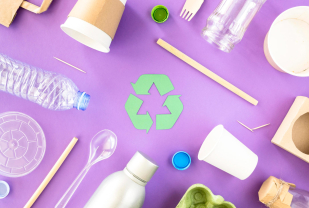Today, almost all of us are bombarded by an excessive amount of information coming from all directions. With the news to consider, job responsibilities to manage, exams to study for, and much more, you can quickly start to feel overwhelmed. And if you’re trying to make an important decision by projecting all the possible outcomes in your mind, the buzzing in your head can become unbearable. All of these factors contribute to information overload.
With technology evolving by the second and responsibilities mounting, it’s no wonder you might feel as if your brain is about to explode. That’s why we’ve developed this guide!

Our team has prepared helpful tips on overcoming information overload and limiting your data consumption. Below, you’ll learn why we become overwhelmed in the first place.
⚡ Why We Get Information Overload
Probably everyone has heard the phrase information overload. However, not everyone understands what it means and why it happens to us. In this section, we will carefully answer these questions.
Information overload can be defined as an excess of information available to someone trying to work. This sheer amount of data can prevent that person from successfully completing their task and making the right decision.
Not everyone is aware, but this is not an entirely modern phenomenon:
- Information overload has been a problem throughout history, especially during the Renaissance and Industrial Revolution.
- Now, with modern technology and low-cost data collection, information overload is a real problem.
But why?
If we look at the way the human brain is designed, we see many similarities to the way a computer works. A brain is a fantastic tool, but it has its limits. It’s essential to understand what information overload is to protect our brains from malfunctioning.
The term “information overload” stems from Bertram Gross’s book called The Managing of Organizations. The book was first published in 1964, but the term became popularized in 1970.
“Information overload occurs when the amount of input to a system exceeds its processing capacity. Decision-makers have fairly limited cognitive processing capacity. Consequently, when information overload occurs, it is likely that a reduction in decision quality will occur.”
– Bertram Gross
In other terms, the human brain suffers from having too much information to process, just like even the most potent computer does if its capacity is overloaded. If we don’t have enough time or energy to process data, then all the information becomes useless or even harmful. Nowadays, mainly because of social platforms and digital media, this abundance of information can seem overwhelming.
There are a few key reasons why information overload occurs:
- Huge volumes of information are very hard to process. It’s no secret that content is created every day. Thus, we are faced with new ideas and information daily.
- The simplicity of duplicating information online makes it easy to create more content. It takes one click to copy and share a blog post, a tweet, or a picture online.
- An increase of channels contributes to information overload. Social media has the power to spread information through many platforms within seconds.
- People can find contradictory information everywhere online. We have to learn how to compare data and evaluate the informational load. False information is also a problem online.
- Quantity over quality is another cause for information overload.
As a result, we feel overwhelmed and stressed with the amount of information available to us. We will discuss the dangers of information overload in the following section of the article.
🤯 7 Dangers of Information Overload
Stress affects our body and our mind in multiple ways. It is especially dangerous if we are exposed to stressful situations for a prolonged period. That’s the reason why we need to address the dangers of information overload. This section will shine a light on how excessive information can affect our minds and body.
Information overload can affect you in several ways:
- You might have difficulty making a decision. When we have too much information to process, we tend to make bad decisions, mainly because we have to make these decisions quickly. Decision-making is taxing to our neural resources. Little decisions take as much energy as big ones.
- You will suffer from memory loss. Multiple studies showed that people who are continually exposed to a lot of information perform worse at simple memory tests. While multitasking is seen by many as a plus, it can harm your memory and mental health.
- Your productivity may decrease. Processing excess information and multitasking have a price, which we pay with our time. When we have to refocus constantly, this costs us energy. That’s why having too much information to process can negatively affect our productivity levels.
- You may develop attention fatigue. Information overload can trigger what’s called attention fatigue. When your brain has too much information to process, it has difficulty staying focused and can even shut down. Once this occurs, you might feel unmotivated and too tired to learn and study.
- You might feel stressed and anxious all the time. Stress is a side effect of information overload, especially if you are already dealing with situations such as upcoming finals or financial problems. In this case, it can push you from feeling stressed to being anxious. For people who are prone to anxiety, information overload can be even more dangerous because it can serve as a trigger.
- Your self-esteem and confidence may go down. Information overload can be a challenge if you have ADHD or another attention disorder. You can begin to feel that your talents and creativity are inferior to the constant need to keep up with data overload. It can eventually lead to burnout and even depression.
- You can get addicted. Not many people know that our bodies are designed to crave new information. Dopamine induces feelings of euphoria when we exercise, eat, drink, and engage in our hobbies. Information also causes this increase in dopamine, which is why we can become addicted. People can become obsessively attached to their electronic devices and the constant intake of data.
If you are unsure whether or not you have information overload, check for the following symptoms. Any of them can indicate that the amount of data you are processing is too high.
👏 How to Overcome Information Overload Guide
As you can notice, technology is not the only cause of information overload. Useless information memorized for an exam or engaging in drama in the workplace can have adverse effects on your critical thinking abilities.
In the following sections, you will find a guide on dealing with information overload, no matter where it comes from. We tried to find not the most obvious yet useful recommendations.

✍️ Write Down Your Thoughts
Try to put everything that has accumulated in your head on paper. This is a helpful exercise whether you are suffering from information overload or not. In this section, we will explain how to free your head from thoughts and structure them.
We recommend following these steps:
Step 1: Write everything that’s bothering you.
Have you ever noticed how just one obsessive thought can interrupt your workflow? The solution to this problem is simple – get distractive ideas out of your head and clear your mind. Write the bothering things down and evaluate them. Maybe they are not that significant at all, or at least they are not urgent, and you can put them aside for a while.
Step 2: Create a list of your tasks.
Try to get the habit of creating lists, and you will see that you can easily control the flow of information. Remember that you can make the lists literally for everything:
- to-do lists,
- checklists,
- reference lists,
- to-buy lists,
- wish lists,
- a list of aims, etc.
Structure your thoughts by putting them on paper or use mobile apps for this purpose. You will notice how your brain releases from tones of information and points-to-remember.
Step 3: Prioritize.
Have you made the lists? Then, set priorities, evaluate your tasks, and decide in what order to complete them. You will see that some can wait for another day, week, or even month. So, wisely plan your time and workload, and you won’t feel overwhelmed.
Step 4: Eliminate what you don’t actually need.
Sometimes, we tend to overload ourselves with information or tasks. That’s why it is essential to cross the unnecessary points out of the list. By eliminating useless stuff, you make your mind clearer and life brighter.
Prioritizing the things, you have to filter what information you get from the Internet. This is where our next tip comes from.
🗑️ Ditch Useless Apps & Sites
No doubts, useless information often comes from the Internet. Constantly scrolling your feed and checking your notifications can affect your focus and productivity. What’s more, you can get easily overwhelmed and stressed out. Therefore, we recommend limiting the sites and applications that you use.
We prepared a list of our practical tips for you. Take a look at them and implement them in your life:
- Identify key information websites. Analyze your lifestyle and determine what kind of information is indeed useful for you. It might be news about the industry you are working in, updates on your favorite brands, technological novelties, etc. Everything that brings you benefits should become your target information source.
- Ditch the rest that you don’t need. Have you identified your key information websites that correspond to your interests? Focus on them and eliminate the other sources. You won’t get any critical insights from there, so why would you fill your head with unnecessary news?
- Delete duplicates. To avoid redundancy, prevent the duplication of information. It’s irritating to receive the same notification several times, isn’t it? So, make sure people know how to reach you. If you prefer to get info via email, leave only your email address. Do you like phone communication more? Give your phone number to people. By doing this, you eliminate the chance of being predisposed to the same information a couple of times.
- Replace apps with physical objects. Today, people prefer using smartphones, tablets, or PCs for taking notes. But how about trying traditional methods of note-taking for this purpose? Using a sheet of paper and a pen, you reduce the risk of being distracted by social media or meaningless notifications.
- Try keeping a diary. Recently, social media platforms became a sort of people’s diaries. But we recommend you to keep a physical journal just for yourself. You don’t need to worry about polishing every single sentence for your Insta or FB page. You can free your brain by writing your thoughts (even the most intimate ones) down in any comfortable way.
- Evaluate the time you spend on apps. In your phone settings, find what you spend the most time on. Most likely, it will be a social network where you get too much new information. If so, you should consider deleting these apps or, at least, setting specific time limits.
- Delete your social media for a week. Well, we know it sounds crazy in the context of today’s fully digitalized world, but this detox practice is worth doing! Analyze your life without social media and see what do you spend your time on. You will become more productive and may not notice the absence of social media platforms in your life.
Along with the tips above, you can try going on an information cleanse:
You’ve probably heard of a food cleanse that is made to maintain your physical health. Yet, your psychological well-being is significant as well. It can be useful to practice information cleanse to boost your mental health.
The whole point is:
You need to stop absorbing any new information for a while. For this purpose, it would be better to do as follows:
- leave all the social media platforms;
- take a break from visiting websites,
- disable mobile apps.
Create an environment where no new information is available and try to implement the knowledge you already have.
Information cleanse seems to be a challenging practice. Yet, if you are willing to take radical steps, it’s definitely worth trying.
🔌 Don’t Forget to Unplug
Ditching some apps and sites isn’t always an option (you can’t delete your work apps, right?). Yet, limiting the time you spend on the Internet is crucial. This section will explain why taking a break from technologies is a vital step to prevent overwhelming.
While talking about information overload, we have to elaborate on digital overload as well. First things first, let’s figure out the meaning of this term.
Digital overload is the increased predispose to electronic gadgets. When people are required to spend too much time in front of screens, their eyes get tired, productivity decreases, and the chance of getting burnout rises. Therefore, it is crucial to keep a work-rest balance and spend some time being aside from gadgets.
The table below contains a bunch of recommendations on how to limit the use of technologies. Check them out!
Some of the blocking apps that can help you:
- Stay Focused is an extension for the Google Chrome browser that helps you monitor your activity on the Internet and boosts your productivity. Just set the websites you want to be blocked and indicate the specific time frames. You will notice the progress right away.
- Rescue Time is designed to monitor your screen time and identify the websites that distract you the most. Use it, analyze your activity, and consider changing your routine to increase your working capacity.
- Freedom app gives you complete freedom in customizing it. Make your list of restricted websites, create a schedule, set alarms, and effectively organize your work on the Internet. The app is suitable for Windows, Android, iOS, and Chrome.
- Y-Productive is a user-friendly app, a perfect option for those striving for sufficient digital work. Why is it unique? Because in addition to blocking websites and tacking your screen time, Y-Productive will also send you real-time productivity feedback. Use them to analyze your habits and change them, if needed.
- Cold Turkey will become your favorite app if you frequently lack motivation. Besides setting limits for your online activity, the program will also send you motivational quotes to remind you about your goals. This indeed boosts productivity!
- Flipd is an app that cares about you. It tracks your screen time and provides some mindfulness practices, reminds you to take breaks, and helps refresh your mind.
- AntiSocial is a perfect option for social media addicts. The app gathers insights on your activity on Instagram, Facebook, Twitter, and other platforms. Moreover, AntiSocial compares your online activity with your friends’ screen time. You can have friendly competitions on being more anti-social. Encouraging, isn’t it?
👉 Pick Your Experts
Looking for information is overwhelming. With so many voices, channels, and experts, it is hard to decide whom to trust. That’s why it can lead to information overload, especially as some information can be overly redundant and repetitive. It would be easier to identify several experts whose opinion is valid and trustworthy. This section of the article will discuss how to choose your experts and why you should do that.
To explain the reasoning, we should elaborate on analysis paralysis. In simple terms, it refers to a situation in which a person cannot make a decision. It happens as a result of overanalyzing and overconsuming information.
Analysis paralysis can prevent you from accomplishing simple and more complex tasks. However, there are ways to protect yourself from being indecisive and unproductive.
Here’s what you should try:
- Limit the number of experts you follow. A good rule is to find one expert you know and respect per subject or field and follow them closely. For instance, if you are trying to be a better writer, follow someone you love reading.
- Create collections of reference materials and people. Unfortunately, we forget a lot of new information if we don’t use it. When we create collections, we can be sure they will remain recorded somewhere. Not only can it help you store the materials, but it can help you keep your laptop or study place neat. You can also develop productive habits when you are studying.
🗃️ Save Information for Later
Very often, information overload happens because a person tries to digest all the information at once. That’s why it is beneficial to learn how to consume one source at a time. In this section, you will learn how to achieve this goal.
The process is simple:
- You need to decide how much information you will be ready or able to consume at once.
- Identify the type of information you need, and don’t forget to determine the best sources and voices.
- Establish a way of receiving, synthesizing, and applying information that will benefit you.
Your goal is to maintain a reliable flow of useful information that you can methodically organize. Staying organized can benefit your life in a variety of ways. You can apply it not only at your workplace but at school and in your private life as well.
Let’s look at more specific cases:
Articles
When it comes to articles you’ve found or received online, you should save most of them for later. You can do it this way:
- Skim through them first. Don’t dive in immediately into reading every single article you find. Go through them, looking for keywords and paying attention to the headings. If you feel that the item is not exactly what you need, give it up. It will help you to save your headspace and your time for more relevant information.
- Do not save articles with the information you already know. With the vast amount of data available online nowadays, you don’t need to overcrowd your laptop or your desk with piles of unnecessary details. Remember about the “less is more” rule when you try to store information.
- Follow the two-minute rule. Another beneficial idea is to stay effective and productive. Suppose you have many short articles, blog posts, and reviews to read. Designate 45 minutes to one hour to do so.
- Delete what you don’t need anymore. Any article you’ve read and utilized can be deleted. Periodically review your documents and ask the following questions:
- Is it still relevant?
- Will I still use it?
- Should it be combined with something else?
- Should it be erased?
Answering these simple questions will help you decide what to do with each article. It’s worth mentioning that the above tips are also true for when you’re researching information using our essays database. The best thing is that thanks to the save feature you can always put aside the content you’re interested in and come back to it later.
Emails
Dealing with study or work emails, you most definitely have to prioritize everything. Here is how you can do so to escape information overload:
- Turn on a filter. You don’t have to drop everything you are doing to respond to an email. However, there is a case in which you have to react immediately. To get only the urgent emails when you are studying and working, you can turn on email filters. And, by the way, do not forget to have a spam filter in your inbox.
- Batch-answer your emails. If your email seems overwhelming, the best way is to take care of it at once. Reply to all the messages and pending requests in one sit to free your time for working and studying. You can do it manually or use an email management tool to make it more fun.
- Utilize your email signature if possible. Look at it as another way to communicate with your colleagues, classmates, clients, and professors. You can put your phone number, a link to your social media, and a line of how you treat your email requests. It helps to manage expectations ahead of time.
- Prepare responses in advance. To save your time and energy, you can prepare answers in advance. You can do it by utilizing your email signature tool or typing all the possible responses in one Word document. The more answers you write in advance, the quicker the process will be.
When struggling with emails, you can employ these tools:
- SalesHandy is a tool best used for businesses, but everyone wishing to stay on track with their emails can try it. It is built to make sending emails more comfortable for you.
- SaneBox is a lifesaver for those who do not want to be interrupted by emails but want to get the most crucial ones. Your email will be subdivided into an inbox folder and a SaneBox folder.
- EmailAnalytics is a tool that tracks your team’s and your email productivity metrics. The best part is that there is no need to install any software.
- Unroll.me is a great way to clean your inbox from all the spam and advertisement you are no longer interested in. You can see all your subscriptions and manage them effectively.
- Mailtrack is another hefty tool that allows you to track the emails you’ve sent. You can see if the recipient opened it, how many times, and when. When you have an assignment or an important project, it is comforting to see that your email was received and opened.
📕 Evade Compulsive Learning
You may think that learning new information is always useful. Unfortunately, it is not. You can clutter your memory with unnecessary data, making it difficult to remember something essential. In the following section, we will explain to you why avoiding studying can be useful sometimes.
- First things first, if you are desperately trying to expand your knowledge, do it wisely. You are a human being, and your brain is not an automatic machine. It needs rest and cannot proceed with data all the time. Thus, don’t try to read all the information available – you will only harm yourself and decrease your productivity.
- Secondly, learn how to filter the data you face every day. There are tons of information available online in the modern world. You can discover anything at any time. But do you need it? Don’t try to be an expert in every field. Better boost your knowledge and skills in your sphere and become a real professional.
- Thirdly, remember that you are fully capable of controlling the flow of information you consume. If you feel like an article isn’t useful for you, just close the tab or put a magazine aside. Keep track of what you read, listen to, watch, and don’t fill your brain with irrelevant info.
And the last two pieces of advice concerning the matter:
- Don’t procrastinate with your phone in hand.
How many times per day do you take your phone and go online? Do you think that it helps you to relax and refresh your brain? No, that’s just self-deception.
While spending your free time on the Internet, you consume tons of information that cluster your brain. So, procrastination with your smartphone in your hands isn’t the best way to take a rest. If you aim to clear your mind, engage yourself in activities that do not involve screen time. - Let yourself dream during the day.
Daydreaming provides you with a perfect opportunity to keep your brain active but avoid consuming new information. To have a quality rest, try to structure the thoughts that already exist in your head. Try spending your free time analyzing them instead of learning new things. Who knows, maybe reflecting on the information will help you develop a unique idea that will drastically change your life.
📆 Postpone Projects
You can get overwhelmed in an instant if you start doing multiple tasks at the same time. It is crucial to learn to set priorities, as discussed in the previous sections, and follow them and distribute duties. Here we will tell you why you can’t try to do everything at once.
This section comes from one crucial rule: you cannot multitask if you want to do something right. It concerns both completing several projects at once and checking your social media profiles while working.
In other words, you should concentrate on one task at a time. Below, we’ve explained in detail what you can and can’t do while working on something.
Thus, when you feel like you’re running out of time or trying to tackle several things at once, just postpone the task. The quality of the completed project always values more than the timing.
Therefore:
Sometimes, it might be more reasonable to take a short break between two major projects and do them not in a hurry. You will get outstanding results, and your physical and mental health will thank you for managing your workload wisely.
❌ Limit Unwanted Conversations
The last piece of advice we can offer you relates to communicating with people in real life and online. In this section, we will discuss why and how to avoid unwanted interactions.
There are some topics in a professional setting (in study or work community) that you have to avoid as they:
a) harm the professional atmosphere and relationships;
b) result in information overload and mix crucial insights with useless data.
In the table below, we’ve listed these harmful conversation ideas.
Unfortunately, unwanted conversations can appear out of nowhere, even when you’re actively avoiding them. We have some useful suggestions on how to escape this situation:
- Don’t engage in online disputes.
You may often see severe quarrels in comments on social media. Don’t take part in them. The criticism here is usually not constructive. Moreover, a simple online argument may turn into cyberbullying. So, prevent negative experiences by omitting such disputes. - Switch the subject of discussion.
If you feel like the conversation is going too far and you feel uncomfortable about it, try to change the topic. Always keep in mind some safe ideas (hobby, summer plans, a joke, etc.). Avoid touchy issues to prevent unpleasant outcomes. - Leave the room.
Another useful trick is to leave the room as soon as you start feeling pressure because of the conversation. Go to the bathroom, answer a phone call, or just go outside to take a fresh breath. When you return, start another topic. - Use your body language.
Let your interlocutor know that you are not interested in the conversation. Don’t make eye contact, cross the arms, pretend like your attention is blown away. - Try to engage one more person in a conversation.
If you have somebody around you who might help you out, use this opportunity. Involve your friend or colleague in a conversation. In this case, the dialogue won’t be too personal, and you will release from pressure. - Just say that you don’t want to talk about it.
Yes, just refuse to participate in the discussion. Sometimes, the best way to avoid unpleasant situations is to be straightforward and clearly express your concerns.
Thank you for visiting our webpage! Follow our advice, and you will no longer be afraid of information overload. Share the article with others – maybe they will also find our guide useful.
🔗 References
- Are We Consuming Too Much Information? – Oksana Tunikova, Medium
- Information Overload, Why it Matters and How to Combat It – Interaction Design Foundation
- Fixing the Overload Problem at Work – Erin L. Kelly and Phyllis Moen, MIT Sloan Management Review, Massachusetts Institute of Technology
- Information Overload in Digital Media News Content – Renjith R., the University of Kerala
- Five Reasons to Take a Break from Screens – Mary Gomes, The Greater Good Science Center, the University of California, Berkeley
- Unplug Take a Break from Technology – Strayer University
- Death by Information Overload – Paul Hemp, Harvard Business Press
- The Science of Analysis Paralysis & Why It Kills Productivity – Becky Kane, Doist
- Why Brain Overload Happens – Lesley University
- Unplugged: a part of Press Pause – Recreation & Wellness, Grand Valley State University
- Save For Later – Libraries, the University of Kansas
- Email Etiquette – A Communication Resource, Heritage University
- Website Research: Evaluating Example Websites – Research Guides at Central Michigan University Libraries
- Developing a Plan for Communication – Community Tool Box, the Center for Community Health and Development at the University of Kansas
- How to Plan for a Busy Week – Sophia Sikowski, Herzing University





![Living on-Campus vs. Living off-Campus [Infographic]](https://ivypanda.com/blog/wp-content/uploads/2020/10/living-on-vs-off-campus-inforgraphic-1-309x208.jpg)

![200 Interesting Historical Events to Write About [New Tips]](https://ivypanda.com/blog/wp-content/uploads/2020/05/medieval-knights-battle-field-309x208.jpg)
This article about information overload, is information overload. Great content though.
Thanks for your feedback. Your opinion is very important for us!